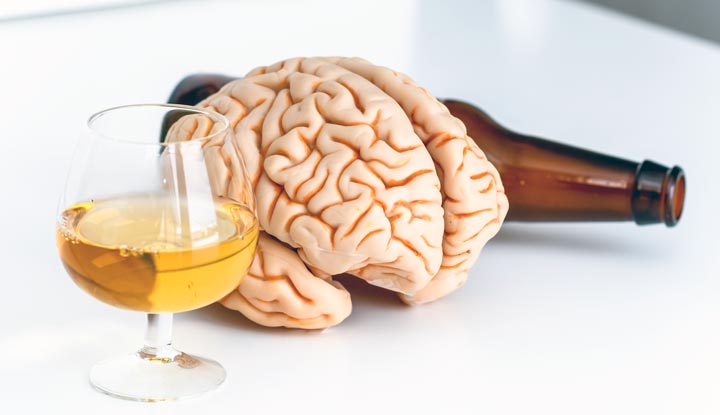The use of alcohol contributes to around 88,000 deaths in the United States every year. As you may already know, many of the deaths are due to motor vehicle accidents, homicide, falls, burns, and other accidents. But can alcohol cause brain damage that leads to death as well? Many studies point to a connection between alcohol and brain damage, read on to find out the details and how to avoid the worst effects of drinking on your mind.
Alcohol and Its Effects on the Brain
Table of Contents
Excessive alcohol use has been shown to damage brain function and cause dementia, learning deficits, memory problems, and other issues. Without professional help, chronic alcohol use can lead to permanent brain damage. However, treatment can sometimes reverse the damage and allow the brain to heal.
Alcohol even has short-term effects on the brain. Since it slows down the areas responsible for cognitive and motor functions, it impacts memory, coordination, judgment, and sleep. When a person drinks large amounts over a long period, the effects can be deadly.
Not only does alcohol negatively affect multiple areas of the brain but it also impacts the spinal cord and nerves. As a central nervous system depressant, alcohol can suppress breathing and reduce body temperature to dangerously low levels.
The Role of Dopamine
Dopamine is a neurotransmitter – a chemical in the brain that transmits signals between brain cells and sends information around the body. Dopamine levels affect mood. The more dopamine in the body, the happier and more motivated you feel. Self-esteem is also higher. In contrast, when dopamine levels are low, you may feel unmotivated or depressed.
The amount of dopamine in the body increases naturally when you have a pleasurable experience such as eating your favorite meal or spending time with a loved one. The experience feels so good that you want to re-live it time and time again.
Alcohol and other addictive substances also increase dopamine levels. However, the spike is much higher than that which occurs naturally. As a result, the desire to repeat the behavior is even more intense. As you continue to drink, the brain gets accustomed to high levels of dopamine and it produces less of the neurotransmitter naturally.
When natural dopamine production drops, the brain needs more and more alcohol to keep the levels artificially high. This is known as tolerance. At this stage, the brain and body depend on alcohol to feel normal. If you stop using alcohol, you’ll experience withdrawal symptoms as the brain tries to achieve equilibrium again.
Long-Term Effects of Alcohol on Brain Matter
The relationship between alcohol and brain damage is best observed over the long term. Chronic drinking can lead to severe withdrawal symptoms that damage the brain cells. Individuals may experience seizures and hallucinations and about five percent of people going through withdrawal experience delirium tremens. This is the most severe form of withdrawal.
Other long-term effects of high alcohol consumption include:
- Brain shrinkage. This results from the loss of gray and white matter.
- Neurotransmitter damage. This lowers energy levels and slows communication between different parts of the brain.
- Cognitive impairment. Alcohol is especially likely to damage the areas of the brain responsible for impulse control and problem-solving. This can lead to alcohol-related dementia. Alcohol abuse can also affect mental processing, verbalization, concentration, and learning.
- Wernicke-Korsakoff Syndrome. This is a brain disorder caused by a lack of vitamin B1 or thiamine. It occurs because people with alcohol use disorders usually have a poor diet and also because alcohol prevents proper vitamin B-1 absorption and storage. Symptoms of Wernicke’s disease can include poor balance, confusion, malnourishment, disorientation, and jerky eye movements. Meanwhile, Korsakoff Syndrome is often characterized by memory problems, poor judgment, and mood imbalances.
Does Alcohol Kill Brain Cells?
When people are concerned about a person’s drinking habits, they often warn them that alcohol will kill their brain cells. It’s well established that alcohol changes the brain but does it really kill the cells?
Research shows that drinking damages the white matter. That’s the tissue deep inside the brain that controls movement and helps us to process our thoughts. It also assists with sending messages to and from the nervous system and other parts of the brain.
A number of conditions can damage the white matter including stroke, high blood pressure, diabetes, and Parkinson’s Disease. However, alcohol can speed things up. Researchers have determined that alcohol is especially damaging to the parts of the brain that are responsible for controlling impulses.
This makes it hard for individuals to quit drinking or even reduce their usage. Fortunately, it’s possible that the white matter could heal if individuals stop drinking before they reach the age of 50.
Chronic drinkers are most at risk for white matter damage. However, people who begin drinking heavily in their teens show slowed and reduced white matter growth. They also damage the gray matter which is responsible for memories, emotional responses, and the senses.
Other research shows that damaged white matter leads to slower and less efficient thinking that can affect people for a long time. This is especially likely if they suffered alcohol-related brain damage at a young age.
Given the importance of both grey and white matter, it’s important for anyone struggling with alcohol addiction to seek professional treatment.
Can Alcoholic Brain Damage Be Reversed?
A lot depends on the severity of the damage. Certain conditions can be reversed with early diagnosis and treatment as well as lifestyle changes. People who have Wernicke-Korsakoff Syndrome may be able to improve their brain function by taking vitamin supplements.
However, the first thing individuals need to do is stop drinking. Detoxing or getting rid of the accumulation of toxins from alcohol is a necessary step in recovering from any alcohol-related illness. Not drinking alcohol and eating a healthy diet can undo some of the effects caused by alcohol abuse.
A Word on Alcohol Poisoning and Overdose Risks
On average, six people die every day from alcohol poisoning in the United States. These deaths often result from binge drinking. Binge drinking refers to consuming a large amount of alcohol in a short time.
The Centers for Disease Control and Prevention defines it as drinking that causes a person’s blood alcohol concentration to reach 0.08 g/dl or higher. This usually happens when women consume four or more drinks in about two hours and men have five or more drinks in the same period.
Just one episode of excessive drinking can lead to an overdose that results in brain damage or even death. An overdose occurs when an individual drinks more alcohol than their body can process, leading to a build-up of toxins. Since alcohol is a depressant, individuals who overdose experience slowed or stopped breathing, irregular heartbeat, and dangerously low body temperature.
Signs of alcohol poisoning include:
- Vomiting
- Confusion
- Seizures
- Hypothermia
- Blueish or pale skin
- Loss of consciousness
It’s important to note that an alcohol overdose is a medical emergency and you should call 911 if you notice these symptoms in an individual.
Long Term Sobriety from Alcohol Is Possible with Treatment for Alcohol Dependence
There are many treatment methods available for people struggling with alcohol dependence. No matter how long you’ve been drinking, recovery is possible. Quitting now can help reverse brain damage and prevent a fatal overdose.
What works for one person may not work for another but when you find the facility and program that meets your needs, you can begin the process of healing. Treatment options include behavioral therapies, medication, and peer support groups.
Choosing the best program can be difficult. However, you don’t need to do it alone. Find Addiction Rehabs can connect you with the most appropriate options. Call us on our 24/7 hotline or fill out the form on this website.
Brandon is a highly skilled content writer and behavioral health marketer with over a decade of experience. In his own words: in my work with Find Addiction Rehabs, I have dedicated my expertise to a cause close to my heart – substance abuse recovery. Through my passion for the field, I’ve successfully compiled a track record of crafting compelling content that educates, inspires, and supports those on their recovery journeys.


